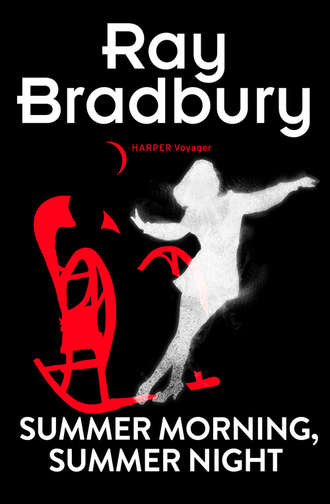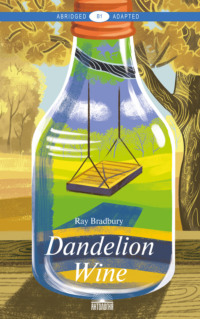
Полная версия
Summer Morning, Summer Night
“I wonder if you could help me?” said the old man. “Is this the old Bidwell house?”
“Yes.”
“Does anyone live there?”
“Miss Ann Bidwell, she’s still there.”
“Thank you.”
“Goodnight.” And Mr. Widmer walked off, his heart pounding, cursing himself. Why didn’t you ask him, you idiot! Why didn’t you say, Mr. Farr? Is that you Mr. Farr?
But he knew the answer. This time, he wanted it to be Mr. Farr. And the only way to insure that it was Mr. Farr was not to shatter the thin bubble of reality. Asking outright might have evoked an answer which would have crushed him all over again. No, I’m not Mr. Farr; no, I’m not him. But this way, by not asking, Mr. Widmer could go to his home tonight, could lie in his upstairs bed, and, for an hour or so, could imagine, with an ancient and implausible tinge of romanticism, that at last the wandering man had come home from long track ways of travelling and long years of other cities and other worlds. This sort of lie was the most pleasant in which to indulge. You don’t ask a dream if it is real, or you wake up. All right then, let that man—bill collector, trash man, or whatever—for this night, at least, assume the identity of a lost person.
Mr. Widmer walked back across the street, around the side of his store, and up the narrow, dark stairs to the second floor where his wife was already in bed, asleep.
“Suppose it is him,” he thought, in bed. “And he’s knocking on the house sides, knocking on the back door with a broom handle, tapping at the windows, calling her on the phone, leaving his card poked under the doors—suppose?”
He turned on his side.
Will she answer? He wondered. Will she pay attention, will she do anything? Or will she just sit in her house with the fenced-in porch and no steps going up or down to the door, and let him knock and call her name?
He turned on his other side.
Will we see her again next May first, and not until then? And will he wait until then … six months of knocking and calling her name and waiting?
He got up and went to the window. There, far away over the green lawns, at the base of the huge, black house, by the porch which had no steps, stood the old man. And was it imagination or was his voice calling, calling there under the autumn trees, at the lightless windows?
THE NEXT morning, very early, Mr. Widmer looked down at Miss Bidwell’s lawn.
It was empty. “I doubt if he was even there,” said Mr. Widmer. “I doubt I even talked to anyone but a lamp-post. That apple was half cider; it turned my head.”
It was seven o’clock. Mrs. Terle and Mrs. Adams came into the cold store for bacon and eggs and milk. Mr. Widmer edged around the subject. “Say, you didn’t see no prowlers near Miss Bidwell’s last night, did you?”
“Were there some?” cried the ladies.
“Thought I saw some.”
“I didn’t see no one,” they said.
“It was the apple,” murmured Mr. Widmer. “Pure cider.”
The door slammed, and Mr. Widmer felt his spirits slump. Only he had seen, and the seeing must have been the rusted product of too many years of trying to live out another person’s life.
The streets were empty, but the town was slowly arising to life. The sun was a reddish ball over the Court House Clock. Dew still lay on everything in a cool blanket. Dew stood in bubbles on every grass blade, on every silent red brick; dripped from the elms and the maples and the empty apple trees.
The dew.
He walked slowly and carefully across the empty street and stood on Miss Bidwell’s sidewalk. Her lawns, a vast green sea of dew that had fallen in the night, lay before him. Mr. Widmer felt again the warm pounding of his heart. For there, in the dew, circling and circling the house, where they had left fine, clear impressions, was a series of endless footprints, around and around, under the windows, near the bushes, at the doors. Footprints in the crystal grass, footprints that melted as the sun rose.
The day was a slow day. Mr. Widmer kept near the front of his store, but saw nothing. At sunset, he sat smoking under the store awning. Maybe he’s gone, maybe he’ll never come back. She didn’t answer. I know her. She’s old and proud. The older, the prouder, that’s what they say. Maybe he’s gone off on the train again. Why didn’t I ask his name? Why didn’t I pound on the doors with him!
But the fact remained that he hadn’t asked and he hadn’t pounded, and he felt himself the nucleus of a tragedy that was beginning to grow far beyond him.
He won’t come back. Not after all night walking around her house. He must have left just before dawn. Footsteps still fresh.
Eight o’clock. Eight-thirty. Nothing. Nine o’clock. Nine-thirty. Nothing. Mr. Widmer stayed open until quite late, even though there were no customers.
It was after eleven when he sat by the upstairs window of his home, not watching exactly, but not going to bed, either.
At eleven-thirty, the clock struck softly, and the old man came along the street and stood before the house.
Of course! Said Mr. Widmer to himself. He’s afraid someone will see him. He slept all day somewhere and waited. Afraid of what people might say. Look at him there, going around and around.
He listened.
There was the calling again. Like the last cricket of the year, like the last rustle of the last oak leaf of the season. At the front door, at the back, at the bay windows. Oh, there would be a million slow footprints in the meadow lawn tomorrow when the sun rose.
Was she listening?
“Ann, Ann, oh, Ann!” Was that what he called? “Ann, can you hear me, Ann?” Was that what you called when you came back very late in the day?
And then, suddenly, Mr. Widmer stood up.
SUPPOSE SHE didn’t hear him! How could he be sure she was still able to hear? Seventy years make for spider webs in the ears, gray waddings of time which dull everything for some people until they live in a universe of cotton and wool and silence. Nobody had spoken to her in thirty years, save to open their mouths to say hello. What if she were deaf, lying there in her cold bed now like a little girl playing out a long and lonely game, never even aware someone was calling through her flake-painted door, someone was walking on the soft grass around her locked house? Perhaps not pride but a physical inability prevented her from answering!
In the living room, Mr. Widmer quietly took the phone off the hook, watching the bedroom door to be certain he hadn’t wakened his wife. To the operator he said, “Helen? Give me 729.”
“That you, Mr. Widmer? Funny time of night to call her.”
“Never mind.”
“All right, but she won’t answer. Never has. Don’t recall she ever has used her phone in all the years after she had it put in.”
The phone rang. It rang six times, and nothing happened.
“Keep trying, Helen.”
The phone rang twelve times more. His face was streaming perspiration. Someone picked up the phone at the other end.
“Miss Bidwell!” cried Mr. Widmer, almost collapsing in relief. “Miss Bidwell?” he lowered his voice. “This is Mr. Widmer, the grocer, calling.”
No answer. She was on the other end, in her house, standing in the dark. Through his window he could see that her house was still unlit. She hadn’t switched on any lights to find the phone.
“Miss Bidwell, do you hear me?” he asked.
Silence.
“Miss Bidwell, I want you to do me a favor,” he said.
Click.
“I want you to open your front door and look out,” he said.
“She’s hung up,” said Helen. “Want me to call her again?”
“No thanks.”
He put the receiver back on the hook.
There was the house, in the morning sun, in the afternoon sun, and in the twilight—silent. Here was the grocery, with Mr. Widmer in it, thinking: She’s a fool. No matter what, she’s a fool! It’s never too late. No matter how old, wrinkled hands are better than none. He’s travelled a long way around, and by his look, he’s never married, but always travelled, as some men do, crazy to change their scenery every week, every month, every year, until they reach an age where they find they are collecting nothing at all but a lot of empty trips and a lot of towns with no more substance to them than movie sets and a lot of people in those towns who are about as real as wax dummies seen in lighted windows late at night as you pass by on a slow, black train. He’s been living with a world of people who didn’t care about him because he never stayed anywhere long enough to make anyone worry whether he would arise in the morning or whether he had turned to dust. And then he got to thinking about “her” and decided she was the one real person he’d ever known. And just a little too late, he took a train and got off and walked up here, and there he is on her lawn, feeling like a fool, and one more night of this and he won’t come back at all.
This was the third night. Mr. Widmer thought of going over, of breaking the glass in the firebox, of setting fire to the porch of Miss Bidwell’s house, and of causing the firemen to roar up. That would bring her out, right into the old man’s arms, by Jupiter!
But wait! Ah, but wait.
Mr. Widmer’s eyes went to the ceiling. Up there, in the attic—wasn’t there a weapon there to be used against pride and time? In all that dust, wasn’t there something with which to strike out? Something as old as all of them—Mr. Widmer, the old man, the old lady? How long since the attic has been cleaned out? Never.
But it was too ridiculous. He wouldn’t dare!
And yet, this was the last night. A weapon must be provided.
Ten minutes later, he heard his wife cry out to him:
“Tom, Tom! What’s that noise! What are you doing in the attic?”
AT ELEVEN-THIRTY, there was the old man. He stood in front of the step-less house, as if not knowing what to try next. And then he took a quick step and looked down.
Конец ознакомительного фрагмента.
Текст предоставлен ООО «ЛитРес».
Прочитайте эту книгу целиком, купив полную легальную версию на ЛитРес.
Безопасно оплатить книгу можно банковской картой Visa, MasterCard, Maestro, со счета мобильного телефона, с платежного терминала, в салоне МТС или Связной, через PayPal, WebMoney, Яндекс.Деньги, QIWI Кошелек, бонусными картами или другим удобным Вам способом.









